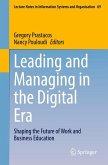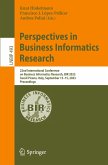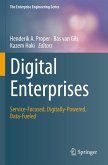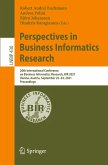Navigating Digital Transformation
Organizational Change, Digital Work, and Individual Behavior
Herausgegeben:Agrifoglio, Rocco; Lazazzara, Alessandra; Za, Stefano
Navigating Digital Transformation
Organizational Change, Digital Work, and Individual Behavior
Herausgegeben:Agrifoglio, Rocco; Lazazzara, Alessandra; Za, Stefano
- Broschiertes Buch
- Merkliste
- Auf die Merkliste
- Bewerten Bewerten
- Teilen
- Produkt teilen
- Produkterinnerung
- Produkterinnerung
This book presents a collection of research papers that explore how managers, practitioners and policymakers can address the challenges of the Digital Transformation with particular reference to the topics of organizational change, digital work, and individual behaviors. Each chapter offers insights into how to tackle DT in order to support work within modern organizations and society as a whole. The plurality of views offered makes this book relevant for scholars, companies, and public sector organizations alike. It gathers revised versions of selected papers (original double-blind…mehr
Andere Kunden interessierten sich auch für
![Leading and Managing in the Digital Era Leading and Managing in the Digital Era]() Leading and Managing in the Digital Era84,99 €
Leading and Managing in the Digital Era84,99 €![Business Process Management Cases Vol. 3 Business Process Management Cases Vol. 3]() Business Process Management Cases Vol. 353,99 €
Business Process Management Cases Vol. 353,99 €![Perspectives in Business Informatics Research Perspectives in Business Informatics Research]() Perspectives in Business Informatics Research50,99 €
Perspectives in Business Informatics Research50,99 €![Digital Enterprises Digital Enterprises]() Digital Enterprises127,99 €
Digital Enterprises127,99 €![Advanced Information Systems Engineering Workshops Advanced Information Systems Engineering Workshops]() Advanced Information Systems Engineering Workshops50,99 €
Advanced Information Systems Engineering Workshops50,99 €![Enterprise Architecture for Global Companies in a Digital IT Era Enterprise Architecture for Global Companies in a Digital IT Era]() Yoshimasa MasudaEnterprise Architecture for Global Companies in a Digital IT Era60,99 €
Yoshimasa MasudaEnterprise Architecture for Global Companies in a Digital IT Era60,99 €![Perspectives in Business Informatics Research Perspectives in Business Informatics Research]() Perspectives in Business Informatics Research38,99 €
Perspectives in Business Informatics Research38,99 €-
-
-
This book presents a collection of research papers that explore how managers, practitioners and policymakers can address the challenges of the Digital Transformation with particular reference to the topics of organizational change, digital work, and individual behaviors. Each chapter offers insights into how to tackle DT in order to support work within modern organizations and society as a whole. The plurality of views offered makes this book relevant for scholars, companies, and public sector organizations alike. It gathers revised versions of selected papers (original double-blind peer-reviewed contributions) presented at the annual conference of the Italian chapter of AIS, which took place in Turin, Italy, in October 2023.
Produktdetails
- Produktdetails
- Lecture Notes in Information Systems and Organisation 73
- Verlag: Springer / Springer Nature Switzerland / Springer, Berlin
- Artikelnr. des Verlages: 978-3-031-76969-6
- Seitenzahl: 336
- Erscheinungstermin: 29. Dezember 2024
- Englisch
- Abmessung: 235mm x 155mm x 19mm
- Gewicht: 511g
- ISBN-13: 9783031769696
- ISBN-10: 3031769694
- Artikelnr.: 71805298
- Herstellerkennzeichnung Die Herstellerinformationen sind derzeit nicht verfügbar.
- Lecture Notes in Information Systems and Organisation 73
- Verlag: Springer / Springer Nature Switzerland / Springer, Berlin
- Artikelnr. des Verlages: 978-3-031-76969-6
- Seitenzahl: 336
- Erscheinungstermin: 29. Dezember 2024
- Englisch
- Abmessung: 235mm x 155mm x 19mm
- Gewicht: 511g
- ISBN-13: 9783031769696
- ISBN-10: 3031769694
- Artikelnr.: 71805298
- Herstellerkennzeichnung Die Herstellerinformationen sind derzeit nicht verfügbar.
Rocco Agrifoglio is Full Professor of Organization Studies at the University of Naples 'Parthenope', Italy. His primary research interests are technology acceptance, community of practice, knowledge management, hybrid work, and e-government. He has participated as a speaker at several international conferences and has published numerous papers in journals, including the Journal of Computer Information Systems, Information Systems Management, Behaviour & Information Technology, Production Planning & Control, Technological Forecasting and Social Change, Public Organization Review, Journal of Innovation & Knowledge, International Journal of Organizational Analysis, Utilities Policy, and BMC Health Services Research. He currently serves as Treasurer/Secretary General of itAIS, the Italian Chapter of the Association for Information Systems (AIS). Alessandra Lazazzara is Associate Professor of Organization Theory and Human Resource Management at the University of Milan, Italy. Her research interests include job crafting, e-HRM, and diversity and inclusion. Her publications appeared in HRM and OB journals such as the Journal of Vocational Behavior, The International Journal of Human Resources Management, and Personnel Review. She is an editorial board member of The International Journal of Human Resource Management, Industrial and Commercial Training, SN Business & Economics, Baltic Journal of Management, and Prospettive in Organizzazione. Furthermore, she holds the position of vice president of itAIS, the Italian Chapter of the Association for Information Systems, and serves as a board member of ASSIOA, the Association of Italian Organization Studies Academics. Stefano Za is Associate Professor of Organization Studies and Information Systems at the University of Chieti-Pescara (Italy). He is the President of the Italian chapter of AIS. He is a personal member of ERCIS and of program committees and reviewer for national and international conferences and journals in domains of Information Systems and Organization Studies. His main research interest is the analysis and design of digital artefacts and organizational systems. He is currently focused on digital innovations and business transformation affecting people and organizations in the digital ecosystem. He was editor for several books and journal special issues. He has also published books, papers on international conferences proceedings, book series and journals such as I&M, JIT, ISeBM, GIQ, CAIS, among others.
Chapter 1. Navigating Digital Transformation: Organizational Change, Digital Work, and Individual Behaviors.- Chapter 2. Disruptive Technology's Transfer Between Organizational Units: The Role of Corporate Headquarters.- Chapter 3. Change Management in the Italian Judicial System: the Case of "Ufficio per il Processo".- Chapter 4. Lessons Learned From a Case Study: A Diamond Model for Implementing and Scaling Process Mining.- Chapter 5. Information Security: Still Not My Job!.- Chapter 6. User Acceptance of Business Information Systems and Their Influence on Organizational Performance: an Agent-based Model.- Chapter 7. The Pivotal Role of Workarounds for Navigating Challenges in Digital Work.- Chapter 8. Opportunities and Constraints in Designing Well-being Programs Supported by Wearable Technologies in Organizations.- Chapter 9. Effective Strategies for Managing and Maintaining Organisational Culture in Virtual and Hybrid Teams: Insights for Organisational Leaders.- Chapter 10. Linking People Analytics, HRM Practices and Sustainable Development Goals Reporting: an Interpretative Framework.- Chapter 11. Robots in Personnel Selection: the Role of Interviewer's Competence Ratings and Interviewee's Fairness Perception.- Chapter 12. Organisational Culture and Hybrid Work in the Italian Public Sector. The Case of a Small University.- Chapter 13. Promoting the Adoption of AI-based Recommendations Through Organizational Practices.- Chapter 14. Business Intelligence for Continuous Auditing.- Chapter 15. Conceptualizing Responsible Adoption of Artificial Agents in the Workplace: A Systems Thinking Perspective.- Chapter 16. AI and Decision-making Process: A Meta-synthesis of the Literature.- Chapter 17. Beyond the Technical Use of Management Control Systems: Valuing Public Employees' Experience of Interactional Fairness.- Chapter 18. Organizational Change and Leadership: A Bibliometric Analysis.- Chapter 19. Women's Resilience in the Time of Covid-19.
Chapter 1. Navigating Digital Transformation: Organizational Change, Digital Work, and Individual Behaviors.- Chapter 2. Disruptive Technology's Transfer Between Organizational Units: The Role of Corporate Headquarters.- Chapter 3. Change Management in the Italian Judicial System: the Case of "Ufficio per il Processo".- Chapter 4. Lessons Learned From a Case Study: A Diamond Model for Implementing and Scaling Process Mining.- Chapter 5. Information Security: Still Not My Job!.- Chapter 6. User Acceptance of Business Information Systems and Their Influence on Organizational Performance: an Agent-based Model.- Chapter 7. The Pivotal Role of Workarounds for Navigating Challenges in Digital Work.- Chapter 8. Opportunities and Constraints in Designing Well-being Programs Supported by Wearable Technologies in Organizations.- Chapter 9. Effective Strategies for Managing and Maintaining Organisational Culture in Virtual and Hybrid Teams: Insights for Organisational Leaders.- Chapter 10. Linking People Analytics, HRM Practices and Sustainable Development Goals Reporting: an Interpretative Framework.- Chapter 11. Robots in Personnel Selection: the Role of Interviewer's Competence Ratings and Interviewee's Fairness Perception.- Chapter 12. Organisational Culture and Hybrid Work in the Italian Public Sector. The Case of a Small University.- Chapter 13. Promoting the Adoption of AI-based Recommendations Through Organizational Practices.- Chapter 14. Business Intelligence for Continuous Auditing.- Chapter 15. Conceptualizing Responsible Adoption of Artificial Agents in the Workplace: A Systems Thinking Perspective.- Chapter 16. AI and Decision-making Process: A Meta-synthesis of the Literature.- Chapter 17. Beyond the Technical Use of Management Control Systems: Valuing Public Employees' Experience of Interactional Fairness.- Chapter 18. Organizational Change and Leadership: A Bibliometric Analysis.- Chapter 19. Women's Resilience in the Time of Covid-19.








